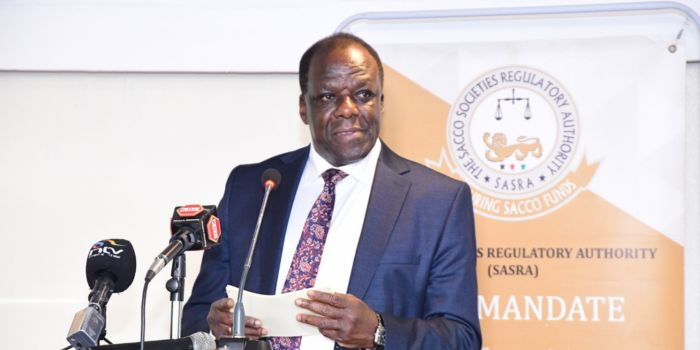Govt Announces Radical Changes for Kenyans in SACCOs

Savings and Credit Cooperative Societies (SACCOs) are grappling with a rising wave of dormant accounts, signalling a sharp decline in member engagement as the government prepares sweeping reforms to overhaul SACCO leadership.
Dormant SACCO memberships surged by 18.6 per cent to 1.45 million last year, reflecting the economic hardships Kenyans face and deepening concerns over the future of these cooperatives.
The government’s move to reform SACCO policies comes at a time when the economy remains under pressure. The Cabinet Secretary for Cooperatives and MSMEs, Wycliffe Oparanya, on Wednesday, revealed plans to limit leadership terms for SACCO heads, some of whom have been in power for over three decades.
His call for SACCOs with assets below Ksh1 billion to merge reflects broader concerns about the sustainability of these cooperatives
Members of the Metropolitan National Sacco Limited at an AGM in 2019.
Photo
Metropolitan Sacco
“We are thinking of having term limits for the officials. Some have been in office for as long as 30 years. Someone became a chairperson when he was 50 years old, now they are 80 and still in charge,” he asserted.
The government’s Cooperative Societies Bill of 2024 aims to solve long-standing governance issues in the cooperatives sector and prevent conflicts of interest among various organs of a cooperative institution.
It will plainly state the duties and obligations of members, boards of directors, and management. Furthermore, it will specify the duration and eligibility of people serving in various roles.
SACCOs have traditionally been a lifeline for millions of Kenyans, offering access to savings and affordable loans. However, the number of dormant accounts has spiked, with 226,893 additional members ceasing contributions last year.
The bulk of these dormant accounts stem from deposit-taking (DT) and non-withdrawable deposit-taking (NWDT) SACCOs, where accounts that remain inactive for six months to a year are classified as dormant. This figure adds to the existing 1.22 million idle accounts, signalling a three-year trend of declining participation.
While the economy grew by 5.6 per cent last year, creating over 848,100 jobs, this growth did little to improve the quality of employment for most Kenyans. The informal sector, which continues to dominate the job market, generated 720,900 of these new jobs, leaving a small portion of formal employment opportunities that SACCOs rely on for new members. Real wages fell by 4.1 per cent as inflation outpaced earnings, leaving workers with fewer savings to invest in voluntary schemes like SACCOs.
The impact of new deductions, including the controversial housing levy and increased pension savings, has further squeezed household incomes, forcing many Kenyans to abandon their SACCO contributions. As a result, SACCO membership growth has slowed dramatically. The 194,923 new active members recruited last year pale in comparison to the 382,315 members added in 2022 and the 442,285 in 2021.
The slow pace of member growth is raising alarms within the SACCO Societies Regulatory Authority (Sasra), which warns that the sector could struggle to maintain a healthy flow of deposits. “The rate at which regulated SACCOs are recruiting new members or reactivating dormant members remains slower than the rate at which existing members are becoming dormant,” Sasra stated in its latest report.
SACCOs rely heavily on deposits to fuel their lending activities, but the decline in new members threatens this vital source of funds. Last year, SACCO loans grew by 11.5 per cent to Ksh758.57 billion, outpacing deposit growth, which increased by 9.9 per cent to Ksh682.19 billion. The gap between loan demand and deposit mobilisation is a growing concern, raising questions about the future financial health of SACCOs.
To address these challenges, Sasra has urged SACCOs to develop new savings and credit products tailored to the changing needs of their members. Reactivating dormant accounts is also a priority, as SACCOs seek to boost member participation in a difficult economic environment. However, without significant changes to leadership structures and policies, the trend of declining SACCO engagement may continue.
President William Ruto with CS of Ministry of Cooperatives and MSMEs Development, Wycliffe Oparanya during his swearing-in at State House Nairobi, August 8.
Photo
PSC



